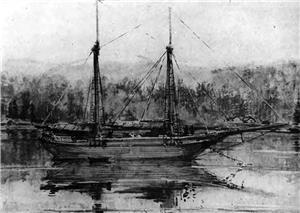The 17th and final essay in our Turning Points series for The Seattle Times, HistoryLink director Walt Crowley looks back on the city’s birth and the uses -- and misuses -- of history. It was published on November 13, 2001 -- the sesquicentennial of the arrival of Seattle’s founding settlers at Alki Beach. HistoryLink would like to express again its special gratitude to Publisher Frank Blethen, Editorial Page Editor Jim Vesely, Assistant Editor Ken Rosenthal, and the Times’ staff for the opportunity to present this collection of interpretive essays during 2000-2001.
An Inauspicious Beginning
On the rainy morning of November 13, 1851, the schooner Exact dropped anchor off of Alki Beach and lowered a boat into the surf. A party of 22 men, women, and children led by Arthur Denny clambered over the side and headed for a roofless cabin at the edge the forest-fringed strand, where they would join advance scouts David Denny and Lee Terry.
One witness aboard the Exact observed that the women “were crying every one of ‘em, and their sun bonnets with the starch took out of them went flip flap, flip flap, as they rowed ashore, and the last glimpse I had of them was the women standing under the trees with their wet bonnets all lopping over their eyes and their aprons to their eyes.” A growing crowd of Duwamish Indians led by Chief Seattle also looked on with a mixture of curiosity and sympathy -- and perhaps foreboding -- as these newcomers took their first tentative steps toward creating a metropolis.
Today, November 13, 2001, marks the sesquicentennial of that melancholy but momentous scene. We are separated from it by a mere 150 years -- the span of just two average human lifetimes -- yet the contrast between the landscape of 1851 and that of modern Seattle could not be more dramatic. Only the mid-November weather has remained constant.
The Uses of History
The sesquicentennial gives us a good excuse to consider the uses -- and misuses -- of history. Most people are familiar with George Santayana’s warning, “Those who cannot remember the past are condemned to repeat it,” but Hegel might have been closer to the truth when he observed that if history teaches one thing it is that no one learns from history. Just look at the Middle East, if you doubt it.
History, in short, is an important teacher, but we are imperfect students. Part of the problem is that we ask history for the wrong things, foremost prophecy. Yes, there are cycles in history and repetitive patterns which flow from the fundamentals of human behavior and social organization, but as recent events should make clear, the future is also punctuated by surprises, shocks, and unprecedented events.
If historians are not qualified to answer calls on the Psychic Hotline, they can reasonably extrapolate the consequences of individual and collective actions based on the past. In this respect, history is a forensic tool which can help us understand what went wrong (or right) in the past, but it cannot guarantee that we will apply the knowledge appropriately.
Good history is empirical, relying on facts, not fantasies, but achieving this is not so easy as it might sound. We at HistoryLink have spent nearly four years trying to get the basic who, what, when, and where of local history straight, and we’re far from done. Historical inquiry is a process of discovery and can yield fresh insights on even the most familiar events.
History, however, cannot be totally objective. It is shaped by the temperaments and circumstances of both chroniclers and readers, who can distill multiple, often contradictory lessons from the same data. The final test scores for most historical propositions usually arrive long after the theorists have turned to dust. History is also subject to a kind of cultural parallax: observers can see (or miss) different phenomena depending on their distance and position in time and space from events.
The Way We Were and Are
So what use does history serve? Ultimately, just one: it helps us to be more human. Subtract any and all analytic or pragmatic applications, and you are left with THE story -- the essential narrative defining our place in time and in the stream of our culture. How do we know who we are without knowing who our forebears were? How do we evaluate our actions without examining those of the past? How can we begin to grasp where we are going without knowing where we came from?
This story defines community character. As a Seattle resident for the past four decades and a serious student of its history for over the past dozen years, what impresses me most about this town is not its vaulted civility (we never were all that nice, actually), but its gritty and resourceful resilience. We don’t give up easily, and we know how to think our way out of trouble.
This civic identity recalls Jane Jacobs’ revolutionary reappraisal of successful urban characteristics. In the early 1960s, she dismissed the utopian landscape of the “garden city” as a sterile monoculture. The energy of great cities, she argued, flows instead from spontaneous, opportunistic, and multicultural human interactions and collective improvisations.
Considering our city’s inauspicious first morning and the ensuing 150 years of booms and busts, Seattle’s history is living proof of Jacobs’ analysis. It also offers some comfort in these unsettled times. Personally, I’ll wager Seattle will be around for another 150 years -- at least.

